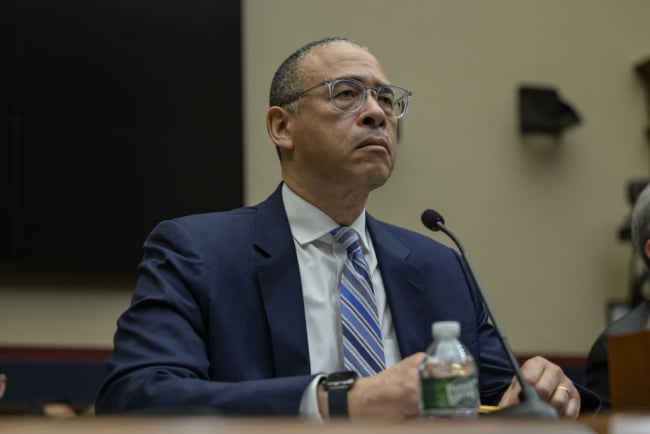You have /5 articles left.
Sign up for a free account or log in.

Rutgers University president Jonathan Holloway spoke before a U.S. House committee in May.
Celal Gunes/Anadolu via Getty Images
Rutgers University president Jonathan Holloway announced publicly Tuesday that he will step down at the end of this academic year following five years at the helm of the three-institution system. In a message to campus, Holloway, Rutgers’s first Black president in its more than 250-year history, wrote that he will take a sabbatical next year for research before returning to the Rutgers faculty.
“There is plenty to do before I complete my term and I remain focused on that work, especially that which is committed to the connections between Rutgers and civic preparedness and civil discourse,” Holloway wrote. “But whatever the topic, I remain steadfast in my belief that Rutgers is on the rise and is earning the respect it has long deserved.”
But at least one congressional Republican is calling for Holloway to leave the presidency sooner, criticizing his record on combating antisemitism. And Todd Wolfson, the joint leader of the national American Association of University Professors and Rutgers’s own AAUP–American Federation of Teachers chapter, expressed disappointment in Holloway’s relations with unions, after Rutgers saw the first faculty strike in its history last year.
That strike ended after intervention from New Jersey’s governor. Rebecca Givan, a Rutgers associate professor and general vice president of Rutgers AAUP-AFT, told Inside Higher Ed, “We should never have had to go on strike. A different approach to bargaining could have yielded a fair contract without a strike.” And the Rutgers University Senate passed a resolution a year ago saying it had “lost confidence” in Holloway, with senators raising issues with his handling of the strike, his ousting of the Rutgers University at Newark chancellor and his merging of the Newark and New Brunswick medical schools, among other complaints.
Though the criticism he’s faced is plentiful, it’s unclear exactly why Holloway, 57, is leaving now.
The president listed multiple accomplishments in his farewell address. “Our first-year class this fall is the largest in our history—better yet, it is among the most diverse and most accomplished as well,” he wrote.
Holloway added that Rutgers “researchers received a record $970 million in grants” this past year. And he touted a three-year-old initiative that “has provided hundreds of life-shaping internship opportunities at nonprofit and government organizations in the New Jersey region and in our nation’s capital.” Holloway was reportedly a candidate this year for the presidency of Yale University but didn’t get the job.
He told Rutgers board chair Amy Towers of his decision to leave last month, according to his message to campus. University spokesperson Dory Devlin wrote in an email to Inside Higher Ed that Holloway notified the chair around Aug. 10. In a statement, Towers said, “Dr. Holloway’s decision was his and his alone; we respect it and thank Dr. Holloway for his passion and service.”
In what The Star-Ledger said was an exclusive interview embargoed until his announcement yesterday, Holloway suggested his departure was related to safety concerns for his family ever since the strike. “I don’t want to be in an environment where I need, where my family needs, protection,” Holloway told the newspaper. “That’s the part I didn’t bargain for.” He added that “now if I’m ever in public, I have security with me.”
Another controversy arose last month over the resignation of Rutgers athletic director Pat Hobbs. NJ Advance Media reported that Hobbs was under investigation over a possible “inappropriate, consensual relationship,” and The Star-Ledger reported on bullying allegations from former athletes against a coach of one team. But Holloway told The Star-Ledger the Hobbs situation “has absolutely nothing to do with this decision.”
Like other presidents of major universities, Holloway faced national criticism for his handling of pro-Palestine protests. In May, his university negotiated an end to an encampment after a few days, making few concessions to protesters. But the U.S. House Committee on Education and the Workforce then called Holloway to testify before it as part of a series of grillings of university leaders for their handling of reports of campus antisemitism.
Republican representatives accused Holloway of capitulating to pro-Palestine protesters, but Holloway’s responses to questions received less public condemnation than those of previous presidents in the hot seat. When pressed on whether he would close the Rutgers Center for Security, Race and Rights, which Virginia Republican Bob Good had taken issue with, Holloway said he had no plans to.
Republican New York congresswoman Elise Stefanik released a statement Tuesday saying Holloway should leave the presidency sooner than the end of this academic year. “Holloway must resign in disgrace immediately for allowing antisemitic mobs to repeatedly target and threaten the safety of Jewish students, surrendering to the pro-Hamas encampment on campus and continuing to employ antisemitic and terror-supporting faculty and staff,” Stefanik said.
North Carolina Republican congresswoman Virginia Foxx, chair of the House education committee, said in a statement that “if he resigned today, President Holloway’s legacy would be one of empowering antisemites and terrorist sympathizers. He must use his final year at Rutgers doing everything in his power to change that.”
Devlin said Holloway’s current pay is about $1.1 million. She said, “His contract did not have an end date, but he committed to at least five years, which he will serve when he leaves office on June 30, 2025.”




